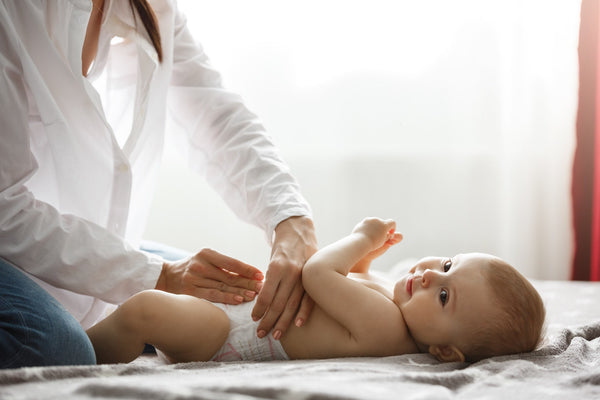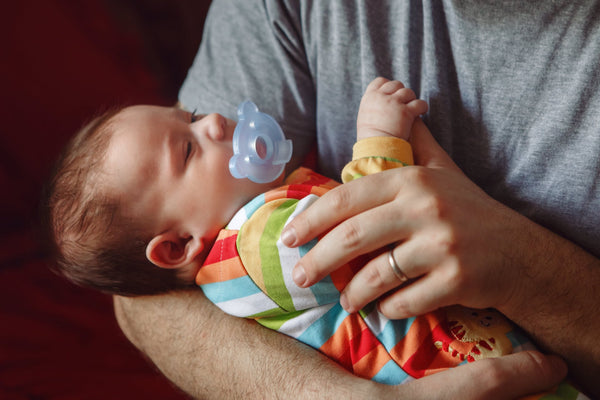Have you ever felt that gut-wrenching fear when your little one falls ill? It's a feeling no parent should ever have to experience, yet it's all too common, especially when it comes to matters of food poisoning in babies. As caregivers, our top priority is always the health and well-being of our precious bundles of joy. That's why understanding and addressing issues like food poisoning in babies becomes paramount in our journey through parenthood.
Picture this: your baby suddenly develops symptoms like vomiting, diarrhea, and fever after a meal. Panic sets in as you try to decipher what could have caused this sudden illness. Could it be something they ate? Is it a stomach bug? The uncertainty is overwhelming, and it's completely understandable. In this blog post, we'll delve into the realm of food poisoning in babies, unraveling its symptoms, exploring treatment options, and offering recovery tips to soothe both your worried mind and your baby's delicate tummy.
Join us as we navigate through this challenging terrain, arming you with the knowledge and confidence to tackle food poisoning in babies head-on. Because when it comes to our little ones, every ounce of information and every precaution we take can make a world of difference. Let's embark on this journey together, ensuring the health and happiness of our most precious treasures.

Recognizing Food Poisoning Symptoms
-
Vomiting and diarrhea: One of the hallmark signs of food poisoning in babies is frequent vomiting and diarrhea. Keep an eye out for sudden episodes of vomiting that come with loose stools or diarrhea after feeding.
- Fever and Irritability: Babies with food poisoning may develop a fever as their body tries to fight off the infection. Additionally, they may become more irritable or fussy than usual, indicating discomfort or distress.
Monitoring for Dehydration
- Signs of Dehydration: Dehydration is a serious concern for babies with food poisoning. Watch for signs such as dry mouth, sunken fontanelle (a soft spot on the baby's head), decreased urine output, and lethargy.
- Importance of Hydration: Ensure your baby stays hydrated by offering frequent breastfeeds, formula, or oral rehydration solutions. Hydration is crucial for preventing complications and aiding in the recovery process.
Immediate Actions to Take
- Stay calm and assess: If you suspect your baby has food poisoning, remain calm and observe their symptoms closely. Take note of any vomiting, diarrhea, fever, or signs of dehydration.
- Hydrate: Offer small sips of water, breast milk, or formula to keep your baby hydrated. Oral rehydration solutions can also help replenish lost fluids and electrolytes.
- Avoid solid foods: Temporarily withhold solid foods and stick to liquids until your baby's stomach settles. Opt for easily digestible options like diluted fruit juices or clear broth.
Importance of Seeking Medical Advice
- Consult a Pediatrician: Don't hesitate to contact your pediatrician if you suspect food poisoning in your baby. Prompt medical attention is crucial for proper diagnosis and treatment.
- Monitor Symptoms: While at home, continue to monitor your baby's symptoms closely. If they worsen or if you notice signs of dehydration, seek medical help immediately.
By taking swift action and seeking professional medical advice promptly, you can ensure the best possible care for your baby and facilitate a speedy recovery from food poisoning.

To prevent dehydration in babies due to food poisoning, replace lost fluids by providing frequent breastfeeds, formula, or oral rehydration solutions.
- Diet Adjustments: Temporarily switch to a bland diet consisting of easily digestible foods like bananas, rice, applesauce, and toast (the BRAT diet) to soothe your baby's upset stomach.
- Probiotics: Introduce probiotic supplements or probiotic-rich foods like yogurt to help restore the balance of healthy gut bacteria disrupted by food poisoning.
-
Medication for Symptom Relief: Depending on your pediatrician's recommendation, over-the-counter medications such as anti-nausea or fever reducers may be used to alleviate symptoms of food poisoning in babies.
Necessity of Medical Treatments
- Rehydration Solutions: In severe cases of dehydration, medical-grade rehydration solutions may be administered to restore electrolyte balance and prevent complications.
- Hospital Care: If your baby's condition worsens or if they show signs of severe dehydration or other complications, hospitalization may be necessary for close monitoring and intravenous fluid therapy.
By following these treatment protocols and seeking medical intervention when needed, you can effectively manage food poisoning in babies and ensure a smoother recovery process.
Home Care Tips for Recovery
Safe Practices for Caring at Home
-
Rest and Comfort: Ensure your baby gets plenty of rest in a calm and comfortable environment to aid in the recovery process from food poisoning in babies.
- Frequent Handwashing: Practice strict hygiene by washing your hands thoroughly before and after handling your baby, preparing food, or feeding to prevent the spread of germs.
- Clean Environment: Keep your baby's surroundings clean and sanitized, including toys, feeding utensils, and diaper-changing areas, to minimize the risk of reinfection.
Nutrition and Hydration Support
-
Gradual Introduction of Foods: Slowly reintroduce solid foods after your baby's stomach has settled, starting with bland and easily digestible options like rice cereal or mashed bananas.
-
Offer Hydrating Foods: Include hydrating foods in your baby's diet, such as water-rich fruits like watermelon or cucumber, to help maintain hydration levels after recovering from food poisoning in babies.
- Breastfeeding or Formula Feeding: Continue breastfeeding or formula feeding as usual to provide essential nutrients and hydration during the recovery period.
Prevention Tips for the Future
Safe Food Handling and Hygiene Practices
-
Thorough Handwashing: Always wash your hands with soap and water before handling food, feeding your baby, or preparing bottles to prevent the spread of germs that can cause food poisoning in babies.
- Clean Food Surfaces: Ensure that all surfaces, utensils, and equipment used for food preparation are clean and sanitized to minimize the risk of contamination.
-
Separate Raw and Cooked Foods: Keep raw meats, poultry, seafood, and eggs separate from ready-to-eat foods to prevent cross-contamination and reduce the likelihood of food poisoning in babies.
Proper Food Preparation and Storage
-
Cook Food Thoroughly: Cook all meats, poultry, and eggs thoroughly to kill harmful bacteria and pathogens that can cause food poisoning in babies.
-
Refrigerate Promptly: Refrigerate perishable foods promptly to slow the growth of bacteria and prevent spoilage, reducing the risk of food poisoning in babies due to consuming spoiled or contaminated foods.
When to Follow Up With a Pediatrician
Signs Warranting a Follow-up Visit
-
Persistent Symptoms: If your baby continues to experience symptoms of food poisoning in babies such as vomiting, diarrhea, fever, or signs of dehydration despite home care measures, it's essential to follow up with your pediatrician for further evaluation and management.
- Severe Dehydration: If your baby shows signs of severe dehydration, such as sunken eyes, a dry mouth, decreased urine output, or lethargy, seek immediate medical attention from your pediatrician to prevent complications.
Maintaining Open Communication
-
Regular Updates: Keep your pediatrician informed about your baby's progress and any changes in symptoms or behavior during the recovery from food poisoning in babies. Open communication ensures that your healthcare provider can provide appropriate guidance and support throughout the recovery process.
- Seek Guidance: Don't hesitate to reach out to your pediatrician if you have any concerns or questions about your baby's health or recovery from food poisoning. Your pediatrician is there to offer expert advice and assistance to ensure the best possible outcome for your little one.
Conclusion
Treating and recovering from food poisoning in babies requires vigilance and care. By recognizing the symptoms early, providing adequate hydration, and following proper treatment protocols, parents can help their little ones overcome this temporary setback. Remember to maintain open communication with your pediatrician and seek medical advice if needed. With patience and dedication, your baby will soon bounce back to their happy, healthy self. Rest assured, as a parent, you're doing everything you can to ensure your baby's well-being. Keep up the good work, and don't hesitate to reach out for support along the way.
FAQ
- How can I tell if my baby has food poisoning?
Common symptoms of food poisoning in babies include vomiting, diarrhea, fever, and lethargy. If you notice any of these signs, it's essential to monitor your baby closely and seek medical advice if needed.
2. What should I do if I suspect my baby has food poisoning?
If you suspect your baby has food poisoning, stay calm and focus on keeping them hydrated. Offer small sips of water, breast milk, or oral rehydration solutions and monitor their symptoms closely. If symptoms persist or worsen, contact your pediatrician for further guidance.
3. Can I continue breastfeeding if my baby has food poisoning?
Yes, breastfeeding is encouraged, even if your baby has food poisoning. Breast milk provides essential nutrients and hydration, which can aid in your baby's recovery. However, if you have concerns or questions, consult your pediatrician for personalized advice.
4. When should I seek medical attention for my baby's food poisoning?
It's crucial to seek medical attention if your baby shows signs of severe dehydration, such as dry mouth, sunken fontanelle, or decreased urine output. Additionally, if symptoms persist or worsen despite home care measures, contact your pediatrician for further evaluation and management.
5. How can I prevent future episodes of food poisoning in my baby?
Practicing safe food handling and hygiene practices, such as washing hands thoroughly before preparing food and separating raw and cooked foods, can help prevent future incidents of food poisoning in babies. Additionally, ensuring that foods are cooked thoroughly and stored properly can reduce the risk of contamination.

